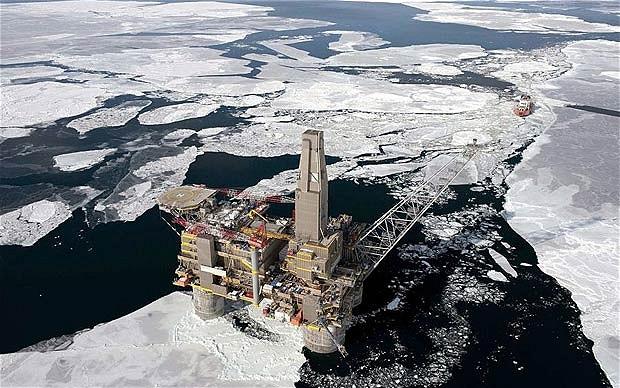
RUSSIA SAVES BP

Two years ago, BP Plc said international sanctions against Russia could hurt its business there.
Didn't happen.
Instead, London-based BP has found a haven in Russia, buttressed by a falling ruble, lower taxes and the lowest operating costs among the world's biggest oil companies. BP earned 22 percent of adjusted pretax profit from its share in Moscow-based OAO Rosneft last year, the most since it acquired a 19.75 percent stake in the Russian oil giant in 2013.
"There's a lot of oil, and as long as the majors can extract it efficiently, Russia can be a hedge against price downturns," said Ildar Davletshin, a London-based analyst at Renaissance Capital. "Lower oil means lower taxes in Russia and the weak ruble helps reduce costs. That's the real cushion for BP in this downturn."
Outside Russia, companies are having a tough time. BP, which produced about 28 percent of its oil and gas in the U.S. last year, reported a $1.6 billion adjusted loss before interest and tax from its upstream business in the country. West Texas Intermediate crude, the U.S. benchmark, dropped 30 percent in 2015 and natural gas declined 19 percent. Oil has increased 12 percent this year.
International Sanctions
The trade restrictions on Russia, imposed over its incursion in Ukraine, struck just as tumbling crude prices weakened its most lucrative industry. The risks inherent in the sanctions have seen some investors, including BP competitor ConocoPhillips, exit Russia as the country endures its longest recession in two decades.
Nevertheless, Rosneft's net income grew last year, making BP a winner.
The ruble averaged 61.25 against the dollar in 2015 compared with 38.62 the previous year. That boosted BP's adjusted earnings before tax and interest from its Rosneft stake to the equivalent of about 80 billion rubles from 72 billion rubles in 2014, according to Bloomberg calculations based on company data.
BP earns its share of profit from Rosneft in rubles and converts that to dollars to report its results. In dollar terms, BP's adjusted pretax income in Russia fell 30 percent to $1.3 billion. The company posted a 51 percent decline in total profit as operations from the U.S. to Australia were hurt by oil's slump.
"We remain committed to our strategic investment in Rosneft," Scott Dean, a company spokesman, said by e-mail, adding that BP complies with all relevant European and U.S. sanctions. "In the low oil-price environment, Rosneft continues to deliver solid operational and financial performance, demonstrating the resilience of its business model."
The weakening ruble, which has also cut companies' costs for services and rigs, has helped Russian producers outperform peers in Europe and the U.S. The world's five biggest oil majors -- Exxon Mobil Corp., Royal Dutch Shell Plc, Chevron Corp., Total SA and BP -- all reported lower profits last year, while Rosneft's earnings rose 2 percent.
The company's capital spending climbed 12 percent to 595 billion rubles in the period as it funded new projects to prevent a decline in output. The other majors reduced investments to protect their balance sheets from crude's collapse.
On April 11, Rosneft became Russia's most valuable company as its market capitalization exceeded that of natural-gas exporter Gazprom PJSC for the first time. BP's shares increased 2.4 percent to 365.45 pence on Wednesday. The stock has gained 3.2 percent this year.
Replacing Reserves
Russia was the only major country where BP replaced all the reserves it produced last year, according to Barclays Plc. The company's global reserve-replacement ratio was 61 percent and would have been just 34 percent without the boost from Russia, the bank said in a March report. BP's Russian reserves were swelled by its purchase of a stake in Taas-Yuriakh Neftegazodobycha LLC, which has a field in the country's Far East, from Rosneft.
BP's share of output from Rosneft accounted for almost a third of its total oil and gas production during the year. The U.K. company's global output increased 1.1 percent to 3.3 million barrels of oil equivalent a day, with 1 million barrels from Rosneft.
Low Cost
That reflects the comparatively low cost of pumping oil in Russia, which has 6 percent of the world's proven oil reserves and more than 17 percent of its gas, according to BP data. Rosneft's operating expense was $2.60 a barrel last year, the lowest among its global peers, according to Bloomberg Intelligence data. Shell's was $6.80 a barrel, Total's $7.80 and BP's $10.30.
Russia's low cost of production is attractive to companies scaling back in more expensive areas and allows them to add new reserves to sustain future output, Renaissance Capital's Davletshin said.
And for BP, the benefits of that environment outweigh the risks.
"BP's Rosneft stake is seen as risky but it's also very prolific," said Philipp Chladek, a London-based energy analyst with Bloomberg Intelligence. "At times of low prices, companies just need to go to the lowest-cost areas, even if the above-ground risks are considerable."
-----
More:





